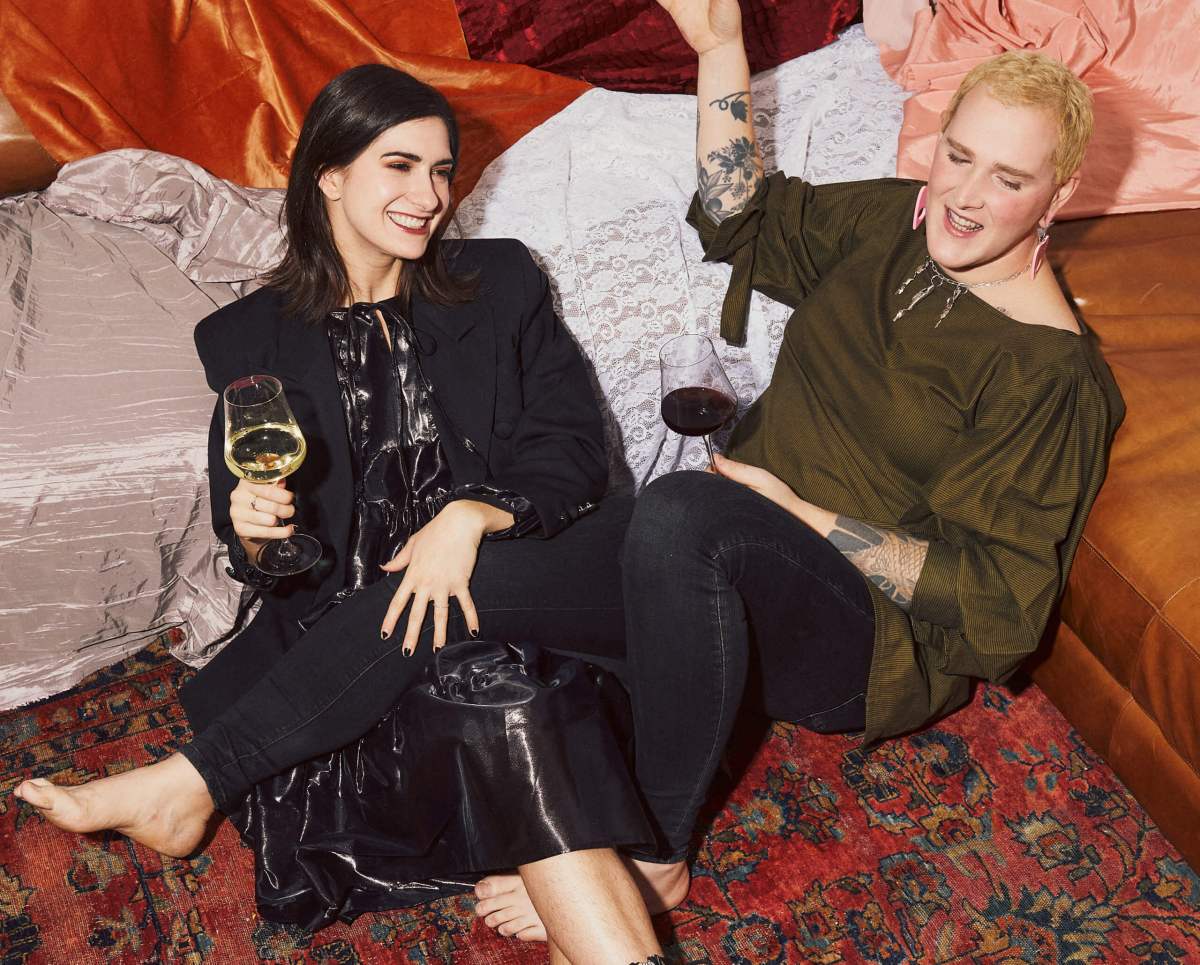A queer-owned restaurant, HAGS, will soon open in the East Village — and the founders hope it becomes a key addition to the queer food scene in New York.
HAGS owners, Telly Justice, chef, and Camille Lindsley, the beverage director, have been promising a new dining experience to New Yorkers for months. They’ve described it to Eater NY as a boutique fine dining experience.
The restaurant is located where celebrity author, restauranteur, and chef David Chang launched his restaurant empire that transformed the restaurant industry.
HAGS’ business owners, who are also life partners, have been busy working with Sarah Carpenter, an architect, designer, and co-owner of Carpenter and Mason, to transform the iconic space at 163 First Avenue into their own.
Justice, 35, and Lindsley, 29, have been keeping their future diners appraised of what’s happening on Instagram. Two weeks ago, they posted from the restaurant’s dining room announcing that they were very close to opening HAGS — and now they’ve confirmed that it will open on July 20.
“It feels almost romantically poetic in a way to have this really iconic space that did launch an empire of someone who at the time was really trying, also, to change the industry,” Lindsley said, finishing Justice’s sentence. “Now we’re, in a way, keeping that tradition of that space being a place that I hope will drive the industry in a new direction.”
Ever since they met nearly seven years ago, Justice and Lindsley have been planning and plotting their vision for the type of restaurant they wanted to open. They bonded over shared political food histories, love of food and wine, and dissatisfaction with the macho kitchen culture in restaurants that leaves no space for queers, transgender people, women, or anyone who isn’t a white man.
Gay City News sat down with Justice and Lindsley and talked about their journey from radical food to fine dining, being queer and transgender in restaurant kitchens, and their vision for HAGS.
On the menu
HAGS plans to provide a safe space for the LGBTQ diners and staff in its small restaurant that seats about 20 guests.
“From the beginning, it was like a very significant part of the plan to make HAGS a very unapologetically queer space,” said Justice, who endured some harrowing experiences related to her queerness and gender identity in the kitchen throughout her career.
Then there’s the love of queer culture.
“We’re both, as individuals, so intrigued and inspired by campiness and camp,” said Justice.
The restaurant’s name itself is campy and tongue-in-cheek. Ripping a page from queer culture, the couple reclaimed the word “hag.” Hag carries a negative connotation for women dating back to before the 13th century when colloquial versions of it were first recorded in the Netherlands, Germany, and England. The word means, “witch” or “ugly old woman.” The latter half of the 20th century saw the combination of two derogatory terms, “fag” and “hag,” to create “fag hag,” meaning a gay man’s straight woman friend. At the same time, the acronym H.A.G.S., which is often written in yearbooks, stands for “Have a good summer,” the couple explained.
Lindsley described the name as “having a little bit of a double entendre” — and Justice agreed.
At HAGS, democracy and inclusivity are on the menu, said Justice, who plans to serve high-quality, flavorful meals by working with the sous chef and other cooks, as well as diners’ dietary needs.
While Justice has been tight-lipped about HAGS’ menu, she hinted that the menu will have hints of Southern cuisine elements, a lot of plant-based options, and “whole animal butchery,” she said.
Lindsley will pair Justice’s dishes with unique wines, many of which will be natural wine, as well as cocktails driven by cider, fortified wines, sake, and vermouths, she said.
“I am sort of hell-bent on making people re-evaluate their negative assumptions about those particular categories,” she said.
Revelation and revolution
Justice and Lindsley did not come from homes that had a profound interest in food or alcohol, they said.
The couple entered the culinary world with a political bent in their teens in Georgia. Justice landed in vegetarian and vegan cafes in Savanah, with a pit stop in Columbia, South Carolina, after escaping from the outskirts of Philadelphia after high school.
“I need to be very far away. I need to have a new place to kind of invent a new persona, and everybody that I knew and all the relationships I had in high school, it felt like they had to die for me to progress into this new space,” Justice said.
She found a home cooking in vegetarian and vegan cafes, where she developed her palate and knife skills and found a community with queers, artists, and activists. She was also able to freely wear what she wanted without judgment.
Lindsley’s gastronomic awakening came out of Atlanta’s punk rock scene, where she grew up, and cooking for the local chapter of Food Not Bombs as a teenager.
“I was always really interested in having this sort of relationship with food that felt very sort of politically charged,” said Lindsley, who wrote her college thesis on feminism and its relationship to vegetarianism.
After graduation, she started working at a restaurant in Decatur, Georgia, a town just outside of Atlanta, where she met Justice.
Separately, the couple hungered for more beyond their radical culinary roots. Justice left the vegan world and entered the fine dining space, but that came with a problematic culture and she was “very discouraged” to express her gender identity. It got so bad that Justice went back into the closet at one point and questioned her career and life.
“I just couldn’t emotionally sustain being a trans woman and doing this work anymore,” Justice said as tears started to well up in her eyes. “It was just so, so rough.”
Lindsley was also shocked when she entered the industry, which she found to be lacking in hospitality. The realities of the restaurant industry also did not align with her activist background.
It was during those challenging times when Justice met Lindsley, forever changing their lives. The couple started having creative sessions that “started building the framework and foundation for HAGS,” Justice said. Their meeting and working and dreaming together kept Justice going through an “absolutely awful” time, she said.
“It felt like we were moving towards something. I could see a light at the end of the tunnel for the first time,” Justice said.
Dreaming big
The couple quickly hit the top working at Atlanta’s best restaurants and learning the industry inside and out. They realized they needed to be in a bigger food market.
“We were spinning wheels a little bit,” Justice said. “Like, we were pushing the work that we could do in Atlanta as far as we really could.”
Justice had briefly worked in New York and wasn’t in favor of going back, but New York was the only logical solution. It was a good move for the couple in 2019. They quickly joined New York’s fine dining grind, landed jobs at some of the city’s beloved restaurants, and started moving up in the Big Apple’s culinary scene.
Then the pandemic hit. They were furloughed and stuck in their apartment during the lockdown. That’s when the magic really began to happen. The years of scheming and planning suddenly took root.
“HAGS kind of materialized almost organically and then we couldn’t stop it. It became its own thing,” said Justice.
They raised $16,116 on Go Fund Me, launched a bunch of pop-ups around New York and one in Atlanta after the lockdown was lifted, and got an investor.
Then then embarked on a hunt for a restaurant space, which took 10 months.
Two and a half years later, the restaurant is poised to open and its concept of a queer, feminist boutique dining experience that is democratic and an equitable workplace will be tested. Many of the cooks, they said, are transgender.
“We just want to bring queer people — and anyone that supports and loves queer people — together, and share a fantastic meal and have a good time,” Justice said.



































